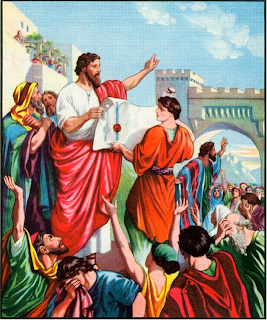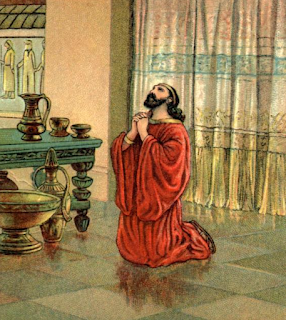 |
| "The Glory of the Lamb" by David van der Plaats (Revelation 5:13) |
"TO CHEW ON: … behold, One like the Son of Man,
Coming with the clouds of heaven!
He came to the ancient of Days,
And they brought Him near before Him.
Then to Him was given dominion and glory and a kingdom,
That all peoples, nations, and languages should serve Him.
His dominion is an everlasting dominion,
Which shall not pass away,
And His kingdom one
Which shall not be destroyed." Daniel 7:13,14
Who of us, familiar with the Bible, can read Daniel's description of the king in his vision and not get it? This is Jesus Daniel is seeing—Jesus whose kingdom he is describing.
He is "One like the Son of man" i.e. recognizable as a person. And how many times haven't we seen His coming described a "coming with the clouds of heaven"? Listen to Matthew's recall of Jesus' words:
"'Then the sign of the Son of Man will appear in heaven … and they will see the Son of Man coming on the clouds of heaven with power and great glory'" - Matthew 24:30 (see also Mark 13:26; 14:62; Luke 24:27; Revelation 1:7; 14:14).
Daniel goes on to describe how the Son of Man's dominion, glory, and kingdom encompass all the kingdoms of earth. All peoples, nations, and languages will serve Him. And His kingdom will be indestructible and last forever.
Though Jesus rebuffed any attempts to install Him as an earthly king, He talked often about His kingdom (e.g. John 3:35-36).
Paul understood His ruler role as well as anyone and explained it to the early church and to us in passages like 1 Corinthians 15:27; Ephesians 1:22 and how about this from Philippians:
"Therefore God also has highly exalted Him and given Him the name which is above every name, that at the name of Jesus every knee should bow, of those in heaven, and of those on earth, and of those under the earth, and that every tongue should confess that Jesus Christ is Lord, to the glory of God the Father "- Philippians 2:9-11
I love how the Bible's message reverberates from the Old Testament to the New in such a consistent way. As we see Daniel's picture of Jesus the king, let's allow our hearts to soar in admiration, awe and worship.
PRAYER: Dear Jesus, I so readily picture You as a wise but meek teacher, striding around Judea and Galilee telling stories and doing miracles. May the image of You as King be planted as firmly in my imagination. Amen.
PSALM TO PRAY: Psalm 57
***********
The Holy Bible, New King James Version Copyright © 1982 by Thomas Nelson, Inc. - Used with permission.



















